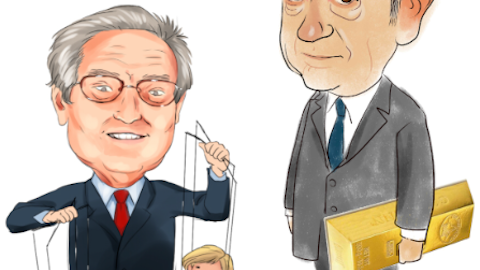The credit card market is anticipated to continue strengthening further in 2016, with credit card companies being very much appreciated by institutional investors and other smaller-scale investors for their earnings predictability, strong growth and attractive dividend yields. As we are at the beginning of a rising interest rate environment, financial lenders such as banks and credit card companies will most likely see their bottom-line growth accelerate in the months and years ahead due to widening rate spreads. Meanwhile, the 60-day credit card delinquencies are anticipated to equal 2.1% in 2016, down from a rate of 2.5% recorded last year. At the same time, the number of credit cards in circulation is anticipated to increase as well this year, so credit services companies appear to be attractive investment opportunities at the moment. For that reason, Insider Monkey decided to compile a list of five credit services stocks favored by the hedge funds tracked by our team.
Through extensive research, we determined that imitating some of the picks of hedge funds and other institutional investors can help generate market-beating returns over the long run. The key is to focus on the small-cap picks of these investors, since they are usually less followed by the broader market and are less price-efficient. Our backtests that covered the period between 1999 and 2012, showed that following the 15 most popular small-caps among hedge funds can help a retail investor beat the market by an average of 95 basis points per month (see more details here).

Alix Kreil/Shutterstock.com
#5. American Express Company (NYSE:AXP)
– Investors with long positions as of March 31: 52
– Aggregate value of investors’ positions as of March 31: $12.56 Billion
The number of hedge funds monitored by Insider Monkey with long positions in American Express Company (NYSE:AXP) dropped to 52 from 53 during the first quarter of 2016, while the value of those positions shrunk by nearly 11% to $12.56 billion. That decline was mainly driven by the 11% drop in the company’s share price in the first quarter. The 52 funds invested in American Express accumulated roughly 21% of the company’s outstanding shares. The shares of the global services company have gained 10% in the past three months, but the stock is still down 5% for the year. It has been rumored that the fourth-largest U.S. bank by assets, Wells Fargo & Co (NYSE:WFC), may be interested in acquiring American Express, which has been said to be looking for potential acquirers. American Express pays out a quarterly dividend of $0.29 per share, which equates to an annual dividend yield of 1.76%. Warren Buffett’s Berkshire Hathaway, a major shareholder of Wells Fargo, owns 151.61 million shares of American Express Company (NYSE:AXP) as of the end of March.
Follow American Express Co (NYSE:AXP)
Follow American Express Co (NYSE:AXP)
Receive real-time insider trading and news alerts
#4. Synchrony Financial (NYSE:SYF)
– Investors with long positions as of March 31: 67
– Aggregate value of investors’ positions as of March 31: $3.45 Billion
Synchrony Financial (NYSE:SYF) fell out of favor with the asset managers followed by our team during the first three months of 2016, when the number of managers with stakes in the company plummeted to 67 from 82 quarter-over-quarter. Similarly, the overall value of those stakes fell 20% quarter-on-quarter to $3.45 billion, partially owing to a 6% drop in the value of Synchrony’s shares. The 67 money managers invested in General Electric Company (NYSE:GE)’s former consumer credit card business, which was spun off in July 2014, amassed nearly 15% of the Synchrony’s total number of outstanding shares. The U.S. credit-card company has seen its market value gain nearly 4% so far in 2016. Synchrony’s interest income for the first three months of 2016 grew 11.7% year-on-year to $3.52 billion due to growth in its average loan receivables. Ken Griffin’s Citadel Advisors LLC upped its stake in Synchrony Financial (NYSE:SYF) by 60% during the March quarter to 9.31 million shares.
Follow Synchrony Financial (NYSE:SYF)
Follow Synchrony Financial (NYSE:SYF)
Receive real-time insider trading and news alerts
#3. Mastercard Inc. (NYSE:MA)
– Investors with long positions as of March 31: 80
– Aggregate value of investors’ positions as of March 31: $6.22 Billion
While the number of money managers from our system with equity investments in Mastercard Inc. (NYSE:MA) remained at 80 during the January-March period, the aggregate value of those investments grew to $6.22 billion from $6.01 billion quarter-over-quarter despite a 3% decline in the share price of MasterCard’s stock. The branded credit-card company has a long track of impressive capital gains, as well as quarterly dividend distributions to shareholders. MasterCard has seen its market cap gain 263% in the past five years and 5% in the past year alone. China issued new rules earlier this week that will enable foreign payment card companies such as MasterCard to operate in the world’s second-largest economy, which has an estimated card payment market of roughly $8.4 trillion. The rules issued by the central bank and the China Banking Regulatory Commission require foreign companies to hold roughly $152 million in registered capital in a local company. Stephen Mandel’s Lone Pine Capital has 5.08 million shares of Mastercard Inc. (NYSE:MA) in its portfolio as of the end of the first quarter.
Follow Mastercard Inc (NYSE:MA)
Follow Mastercard Inc (NYSE:MA)
Receive real-time insider trading and news alerts
#2. Paypal Holdings Inc. (NASDAQ:PYPL)
– Investors with long positions as of March 31: 87
– Aggregate value of investors’ positions as of March 31: $5.64 Billion
Paypal Holdings Inc. (NASDAQ:PYPL) received more love from the hedge funds monitored by our team during the March quarter, as the number of funds invested in PayPal increased to 87 from 84 quarter-on-quarter. At the same time, the dollar value of those funds’ equity investments in the payment processing company rose 3% quarter-over-quarter to $5.64 billion, mainly due to a 7% price appreciation of PayPal stock. Approximately 12% of the company’s outstanding common stock was amassed by the 87 money managers tracked by Insider Monkey. PayPal shares have not changed much since the company spun off from eBay Inc. (NASDAQ:EBAY) last summer, as the stock has gained only 2% since then. However, the company appears to be well-positioned to grow along with other competitors in the market that processes nearly $100 trillion per year. The company’s peer-to-peer payments app called Venmo will mostly likely spur additional growth in the years ahead, as Jefferies analysts believe the “Pay With Venmo” platform could add between 2.1% and 5.5% to PayPal’s 2017 earnings. Carl Icahn’s Icahn Capital LP has 37.83 million shares of Paypal Holdings Inc. (NASDAQ:PYPL) among its holdings as of the end of March.
Follow Paypal Holdings Inc. (NASDAQ:PYPL)
Follow Paypal Holdings Inc. (NASDAQ:PYPL)
Receive real-time insider trading and news alerts
#1. Visa Inc. (NYSE:V)
– Investors with long positions as of March 31: 106
– Aggregate value of investors’ positions as of March 31: $9.22 Billion
Visa Inc. (NYSE:V) is the favorite credit services stock among the hedge funds followed by our team, with 106 asset managers holding shares of the company at the end of the March quarter, up from 101 f. Nonetheless, the overall value of those managers’ equity positions in Visa declined to $9.22 billion from $9.39 billion quarter-over-quarter, partly owing to a 1% drop in the value of Visa shares. Visa dominates the credit services industry with a 47% market share based on network purchase volumes in 2015. Moreover, there was an astonishing number of 329 million Visa cards in circulation at the end of 2015, more than the cards of Visa’s three closest industry competitors combined. The company’s operating revenue for fiscal 2015 was $13.9 billion, up from $12.7 billion in fiscal 2014 and $11.8 billion in fiscal 2013. Visa shares are up by 51% in the past two years and up 4% thus far in 2016. Ken Fisher’s Fisher Asset Management reported ownership of 14.79 million shares of Visa Inc. (NYSE:V) through the latest round of 13Fs.
Follow Visa Inc. (NYSE:V)
Follow Visa Inc. (NYSE:V)
Receive real-time insider trading and news alerts
Disclosure: None




